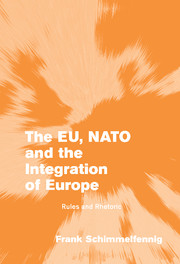Book contents
- Frontmatter
- Contents
- List of figures
- List of tables
- Acknowledgments
- List of abbreviations
- Introduction
- PART I Security, power or welfare? Eastern enlargement in a rationalist perspective
- PART II Expanding the Western community of liberal values and norms: Eastern enlargement in a sociological perspective
- 4 Sociological institutionalism and the enlargement of regional organizations
- 5 Eastern enlargement and the Western international community
- 6 The event history of enlargement
- Conclusion: the sociological solution to the enlargement puzzle
- PART III Association instead of membership: preferences and bargaining power in Eastern enlargement
- PART IV From association to membership: rhetorical action in Eastern enlargement
- Strategic action in international community: concluding remarks
- Appendix (Interviews)
- List of references
- Index
6 - The event history of enlargement
Published online by Cambridge University Press: 22 September 2009
- Frontmatter
- Contents
- List of figures
- List of tables
- Acknowledgments
- List of abbreviations
- Introduction
- PART I Security, power or welfare? Eastern enlargement in a rationalist perspective
- PART II Expanding the Western community of liberal values and norms: Eastern enlargement in a sociological perspective
- 4 Sociological institutionalism and the enlargement of regional organizations
- 5 Eastern enlargement and the Western international community
- 6 The event history of enlargement
- Conclusion: the sociological solution to the enlargement puzzle
- PART III Association instead of membership: preferences and bargaining power in Eastern enlargement
- PART IV From association to membership: rhetorical action in Eastern enlargement
- Strategic action in international community: concluding remarks
- Appendix (Interviews)
- List of references
- Index
Summary
In this chapter, I expand the analysis of NATO and EU Eastern enlargement in various ways: first, to a third European organization, the Council of Europe; second, to all European countries in the broad definition of the “OSCE region”; third, to the entire period since the foundation of the Western organizations; and fourth, to other enlargement events including the establishment of institutionalized relations between the organization and an outsider state and the withdrawal or exclusion of associated and member states. The rationale of these various extensions is to increase the number and variety of observations implied by the liberal community hypothesis about enlargement and, thereby, to put this hypothesis to a more demanding test than that of EU and NATO Eastern enlargement alone.
The tool for this test is event history analysis, a multivariate statistical analysis especially designed to analyze the conditions under which an event is more or less likely to occur. Before discussing the results of the event history analysis, I will specify the dependent variable “enlargement events,” present some descriptive evidence about their occurrence, and explain the research design.
Enlargement events
To analyze the expansion of West European regional organizations, I developed the Enlargement Database (ENLABASE). ENLABASE contains data on the development of institutional relationships between the European Union, NATO and the CoE, on the one hand, and the (up to) fifty-three countries of the OSCE region, on the other.
- Type
- Chapter
- Information
- The EU, NATO and the Integration of EuropeRules and Rhetoric, pp. 112 - 151Publisher: Cambridge University PressPrint publication year: 2003



